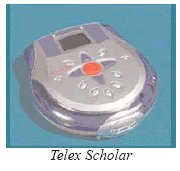|
Volume 14, No. 4, Fall 2006 |
Subscribe to AT Messenger Download PDF Viewer |
| PDF Version (for printing) Large Print (PDF) Text Version |
RFB&D: Providing Audio-based Print Alternatives
Recording for the Blind & Dyslexic (RFB&D), a nonprofit organization, is the nation's leading educational library serving people who cannot effectively read standard print because of a visual impairment, learning disability, or other physical disability. The organization provides audio textbooks read by trained volunteers familiar with the subject areas of the texts. It serves all educational levels, from kindergarten to post-graduate and beyond, in a broad range of subjects. With over 29,000 titles available in its AudioCD format, RFB&D works as a lending library, distributing books to eligible members. Memberships are reasonably priced, easy to establish, and are available for individuals, schools, and institutions. Currently, RFB&D distributes audio textbooks to nearly 150,000 members nationwide. Approximately 70 percent of those using RFB&D audio textbooks have dyslexia or other reading-based print disabilities, and about 25 percent are blind or have a visual impairment. The remainder of users are those whose mobility limitations interfere with turning pages and/or holding a book comfortably.
 RFB&D audio textbooks are played using specialized playback devices or software that enable users to navigate books by page, chapter, or section, adjust the speed of the reading voice, and place bookmarks within the book. Numerous hardware and software options are available. DATI's ATRCs have several of these players in stock, and the AT Specialists would be happy to give you a demonstration or lend you a device for a trial use period. Through the end of December, RFB&D is offering schools two Telex Scholar playback devices at no cost when they purchase a new RFB&D Institutional Membership. For more information, contact Michael Bloom, RFB&D's Director of Membership Development, at (609) 720-8419 or at mbloom@rfbd.org.
RFB&D audio textbooks are played using specialized playback devices or software that enable users to navigate books by page, chapter, or section, adjust the speed of the reading voice, and place bookmarks within the book. Numerous hardware and software options are available. DATI's ATRCs have several of these players in stock, and the AT Specialists would be happy to give you a demonstration or lend you a device for a trial use period. Through the end of December, RFB&D is offering schools two Telex Scholar playback devices at no cost when they purchase a new RFB&D Institutional Membership. For more information, contact Michael Bloom, RFB&D's Director of Membership Development, at (609) 720-8419 or at mbloom@rfbd.org.
If you've wondered about the impact of print alternatives, just read this testimonial from Lucinda Greene, the mother of a son with a reading disability.
My son has a reading processing difficulty. An otherwise bright and articulate 12-year-old attending school in Denver, Jack's brain must work very hard to decode the written word. By the time he has completed reading a sentence, he often has no ability to comprehend what he has just read.
After struggling through 3rd, 4th, and 5th grade reading and writing assignments with extraordinary effort and tears of frustration, we were introduced to the local chapter of Recording for the Blind & Dyslexic. By listening to the written word on CD while reading along in the text, Jack can comprehend the material like other children. Thanks to the assistive technology made available through RFB&D, Jack earned honor-roll grades throughout his 6th grade school year.
In Jack's words, "After the audio books, it was a piece of cake to read and understand the material I was reading. It decreased my homework time by 50 percent! The audio books gave me more time to ride my bike or go play basketball with my friends. I also felt so much more confident about my work that if a teacher gave a pop quiz, it would be a snap!"
This is music to a parent's ears. Nothing is more difficult than watching a child struggle with a disability. How wonderful that RFB&D has allowed Jack to reach his full potential as a student.
Thankfully, our family is able to afford the assistive technology made possible by RFB&D, but so many other children and schools in Colorado are not …I encourage you to access www.rfbd.org for further information about this wonderful non-profit!
*************************************
Ms. Greene's story was originally shared through a web posting. She granted permission to RFB&D to share her testimonial with others, and RFB&D has permitted us to share portions of her story with readers of The AT Messenger.
